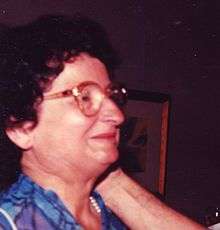Marie-Claire Alain
Marie-Claire Alain (10 August 1926 – 26 February 2013) was a French organist and organ teacher best known for her prolific recording career.[1]

Background and education
Marie-Claire Alain was born in Saint-Germain-en-Laye on 10 August 1926.[2] Her father Albert Alain (1880–1971) was an organist and composer, as were her brothers, Jehan (1911–1940) and Olivier (1918–1994). At the age of 11 she began assisting her father when he played organ in the parish church of Saint-Germain-en-Laye.[1] She studied at the Conservatoire de Paris in the organ class of Marcel Dupré, where she was awarded four first prizes.[3] She also studied harmony there with Maurice Duruflé.[2]
Career
Alain won the 2nd prize for organ at the Geneva International Music Competition in 1950.[4]
She taught at the conservatory of Rueil-Malmaison and the Paris Conservatory.[1] Her pupils included George C. Baker, Diane Bish, Guy Bovet, James David Christie, Monique Gendron, Gerre Hancock, Edward Higginbottom[5], Marcus Huxley, Gunnar Idenstam, Wolfgang Karius, Jon Laukvik, Michael Matthes, Domenico Morgante, Daniel Roth, Wolfgang Rübsam, Helga Schauerte, Dong-ill Shin, de:Martin Strohhäcker, Marina Tchebourkina, Thomas Trotter, Fritz Werner and the Hungarian Zsuzsa Elekes. Upon her death, the list of her students was described as a "who's who of the present-day organ world".[1]
She was the most-recorded classical organist in the world, with over 260 recordings in her catalogue. Alain recorded the complete organ works of J.S. Bach three times as well as the complete organ works of over a dozen other major composers of works for the organ, as well as many individual works.[3] She was devoted to the organ works of her brother Jehan, who died before she began her conservatory studies. A recording of works for organ and trumpet with Maurice André was among her most popular.[1] When her third recording of Bach's works for organ appeared in 1994, she explained to The Organ, a British journal, why she was recording them again:[1]
It's because of the instruments, the instruments above everything else, and the fine state to which they have been restored—and the fact that they are now accessible. These recordings use instruments from Bach's time, and we know that Bach even played some of them—it's an extraordinary feeling, to put your hands on the keyboard, knowing that he was there 250 years before you!
Alain had a long association with the St Albans International Organ Festival.
She succeeded her father as organist of the parish church of Saint-Germain-en-Laye after his death in 1971 and served for 40 years.[1]
She married Jacques Gommier in 1950. He died in 1992. Their son Benoît died in 2010. Alain died on 26 February 2013 in a nursing home in Le Pecq, a suburb of Paris, survived by their daughter.[1]
Awards
- Sonning Award (1980; Denmark)[6]
- Grand Officer of the Legion of Honour (2010; France)[7]
References
- Whitney, Craig R. (March 4, 2013). "Marie-Claire Alain, Master of the Organ, Dies at 86". New York Times. Retrieved March 4, 2013.
- Randel, Don Michael, ed. (1996). "Alain, Marie-Claire". The Harvard Biographical Dictionary of Music. Cambridge, Massachusetts: Belknap Press of Harvard Univ. Press. pp. 9–10. ISBN 0-674-37299-9.CS1 maint: extra text: authors list (link)
- "Marie Claire-Alain (Organ)". Bach Cantatas. Retrieved March 4, 2013.
- "Laureates". Concours De Geneve International Musical Competition. Archived from the original on 6 January 2012. Retrieved 12 December 2011.
- Higginbottom, Edward. "The liturgy and French classical organ music: a study of the liturgical background to organ music in France during the 17th and 18th centuries". idiscover.lib.cam.ac.uk. Retrieved 2020-05-02.
- "Marie-Claire Alain". Léonie Sonning Foundation. Retrieved 23 February 2020.
- "Remembering Marie-Claire Alain". OUPblog. Oxford University Press. 20 March 2013. Retrieved 23 February 2020.